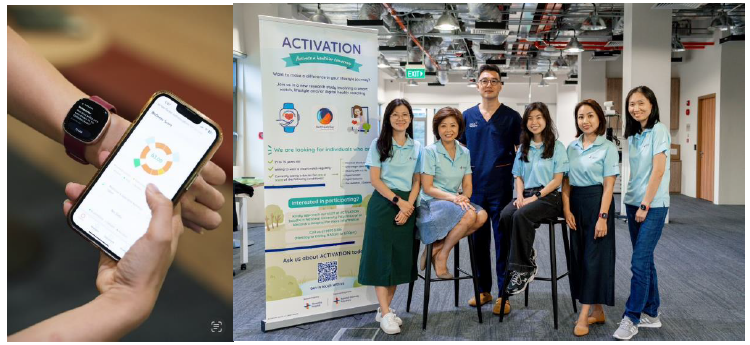
In a move to promote healthier lifestyles and tackle chronic conditions, Alexandra Hospital has launched the ACTIVATION research initiative, leveraging digital technology to enhance population health.
The ACTIVATION research initiative, which commenced in August this year, aims to engage 1,700 participants, and to-date has more than 300 already on board. It targets individuals aged 21 to 75 who are at risk of developing hypertension, diabetes, hyperlipidaemia and obesity. This initiative in alignment with the broader "Healthier SG" strategy, a national strategy by the Ministry of Health (MOH) focusing on preventive health, and is implemented with support from the MOH Health Innovation (MHI) Fund. Healthier SG aims to empower Singaporeans to take steps towards better health, by encouraging them to enrol with a family doctor of choice, co-develop a personalised health plan with their doctor and get support to lead healthier lifestyles.
This initiative is a collaborative effort by the lead research team from Healthcare Redesign department of Alexandra Hospital, Google and ConnectedLife Health. It is supported by National University Polyclinics (NUP), which serve as recruitment and collaboration sites through family doctors and GP referrals at its various polyclinics[1] in the west.
The ACTIVATION initiative employs a mixed-methods research approach, including a randomised controlled trial (RCT) to evaluate the effectiveness of digital interventions, behavioural change assessments using the Transtheoretical model, data analysis from lifestyle tracking and qualitative interviews. Participants are divided into three groups, each receiving different levels of intervention:
a) a smartwatch only,
b) a smartwatch with access to a dedicated application to monitor their lifestyle choices and nudging system, andc) a smartwatch with a dashboard, nudging system, and digital health coaching in the form of human digital health coaches, of which AH has since employed three such coaches, to guide participants using the ConnectedLife dashboard.
The research initiative seeks to find out the comparative efficacies of each group and level, with special emphasis on finding out if digital health coaches can play a multifaceted role, developing personalised lifestyle goals, providing digital interventions, and offering motivational support.
The initiative aims to research efficacies and outcomes on:
a) Effectiveness of Digital Interventions: Assessing whether wearable technology, combined with digital health coaching and personalised nudges, can lead to sustained behavioural changes. By adopting digital solutions, the initiative seeks to demonstrate the efficacy of modern interventions in managing health.
b) Personalisation of Preventive Health: Using data-driven insights from wearable technology to personalise preventive health measures at a population level. This approach aims to tailor interventions based on individual health data, enhancing the effectiveness of preventive care.c) Support for chronic disease management: Providing a low-touch, high-reach digital solution to enhance care engagement and future-proof the management of non-communicable diseases (NCDs) and chronic conditions.d) Enhanced Patient Engagement and Motivation: Increasing patient engagement and motivation for self-care management through personalised nudges and support. The initiative seeks to instil a proactive approach to health management, encouraging individuals to make informed lifestyle choices.
The research team at AH is keen to explore if a more personalised approach is more likely to engage and motivate individuals compared to generic nudges from a device, and if it is more effective in facilitating long-term behavioural change compared to the limited capabilities of a smartwatch. The team will also validate if health coaches can work in collaboration with healthcare providers to manage and support primary care patients holistically, thereby ensuring that lifestyle interventions are aligned with medical advice and treatment plans, providing a more comprehensive approach to health management.
Ms Carol Yap, a former nurse of 28 years, who is now a digital health coach[2] said, “While smartwatches can provide useful data and reminders, the addition of a human health coach offers a more personalised, supportive, and effective approachto lifestyle intervention, and play a crucial role in bridging the gap between technology and personalised healthcare, enabling patients to make informed decisions and maintain healthier lifestyles.”
Dr Alexander Yip, Head of AH’s Healthcare Redesign department and a gastroenterology consultant as well as the Principal Investigator of this initiative, said, “The ACTIVATION initiative represents a significant advancement in Singapore's efforts to integrate technology with healthcare, aiming to improve health outcomes at the population level. By leveraging digital interventions and the expertise of digital health coaches, patient health and lifestyle can be improved through continuous monitoring with wearables, personalised lifestyle goals, and coaching tailored to individual needs. The initiative aims to empower individuals to take charge of their health. As findings emerge, the research initiative is expected to provide valuable insights into the potential of digital solutions in healthcare and the profile of individuals who might respond better to them, influencing future public health strategies.”
Participant Criteria:
To participate in the research, volunteers must have medical records of any chronic conditions with AH or seven polyclinics under National University Polyclinics and the General Practitioners of NUHS Primary Care Network. Patients from NUH or Ng Teng Fong General Hospital or any other hospital from other health clusters may also be considered if they have no primary doctors before for their chronic conditions.
1. 21 – 75 years old
2. Willing to wear a smart watch regularly for a year plus
3. Seeing a doctor for one or more of the following conditions:
- Elevated blood pressure
- Hypertension
- Obesity (BMI more than 27.5)
- Hyperlipidemia
- Pre-diabetes / Diabetes
4. Do not have established end-organ disease (e.g. IHD, CKD, CLD, CVA)
5. Do not have physical impairment
6. Is referred by a doctor for this initiative
1 All seven polyclinics in the west under NUP are collaborating sites of referral.
2 Digital Health Coaches (DHCs) will be trained and receive certification from Health Coaching American Council. Currently on this research programme, there are three DHCs.
















